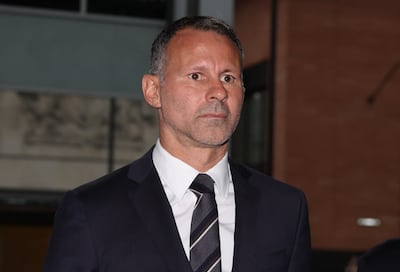A prodigious and precocious talent, Ryan Giggs enjoyed a glittering career with Manchester United where he accumulated a medal collection which bears comparison with those of football’s greats.
The knowledge and expertise he gleaned during a glittering career led to him becoming a coach who guided Wales, his native country, to the Euro 2020 finals — held last year due to the coronavirus — but allegations of assault meant he did not join his team at the tournament as he stepped down for his assistant Rob Page to take over.
For almost three decades, the Welshman, 48, has been a poster boy for the game, the benchmark to which others aspire after rising from a difficult childhood to secure a place in the Old Trafford pantheon and a reputation which extends much further.
Born Ryan Wilson in Cardiff in November 1973, he moved to Salford aged 7 when his father Danny Wilson headed north to pursue a career in professional rugby league, adopting his mother’s maiden name, Giggs, after his parents split up.
If life was testing, football was his escape and having demonstrated his abundant potential as a schoolboy, he was snapped up by United from under the noses of derby rivals Manchester City on his 14th birthday.
Impressed by Giggs’s pace and dribbling ability, manager Sir Alex Ferguson thrust him into the limelight as a 17-year-old and, while placing a protective arm around his prodigy, expertly nurtured his budding talent.
Ferguson once said: “When Ryan runs at players he gives them twisted blood. They don’t want to be a defender any more.”
Swiftly labelled “the new George Best”, a tag which never seemed to weigh him down, the winger instantly took to senior football, with Ferguson all the while ensuring his feet remained firmly on the ground.

He won his first silverware as a member of the side that beat Nottingham Forest in the 1992 League Cup final but, perhaps as significantly, he was also in the United team that won the FA Youth Cup that year.
The core of that side — the fabled ‘Class of 92’, which comprised Giggs, Gary and Phil Neville, David Beckham, Paul Scholes and Nicky Butt — went on to be the nucleus of the first team that swept all before them.
Giggs constantly adapted his game to the challenges that came his way and as age started to take its toll, he transformed himself from a flying winger with a knack of scoring spectacular goals into a more intuitive midfielder, a process which did little to blunt his influence.
When he finally hung up his boots at the age of 40 in 2014, he had amassed 963 appearances for United and won 34 trophies, including 13 Premier League titles and two Champions Leagues, scoring 168 goals.
On the international front, he earned 64 caps for Wales between 1991 and 2007 but never played at a major tournament.
Having worked as player-coach under Ferguson’s successor David Moyes, Giggs briefly took charge of the first team after the Scot’s dismissal in April 2014, and was retained as assistant to Louis van Gaal on his appointment.
Tainted by association with the Dutchman’s ill-fated spell at the helm, his near 30-year stay on the red half of Manchester drew to a close in 2016, only for a dream job to come his way in January 2018 when he was appointed Wales boss.
The national team, which had made it to the Euro 2016 semi-finals but failed to qualify for the World Cup two years later, prospered under his charge, with a new generation of players emerging to ensure a return to the European stage.

















